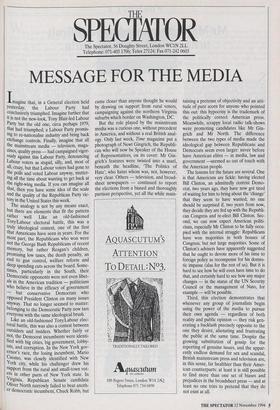SPECTAT THE OR
The Spectator, 56 Doughty Street, London WC1N 2LL Telephone: 071-405 1706; Telex 27124; Fax 071-242 0603
MESSAGE FOR THE MEDIA
Imagine that, in a General election held yesterday, the Labour Party had conclusively triumphed. Imagine further that it is not the new-look, Tony Blair-led Labour Party but the old one, circa perhaps 1979, that had triumphed; a Labour Party promis- ing to re-nationalise industry and bring back exchange controls. Finally, imagine that all the mainstream media — television, maga- zines, quality press — had campaigned vigor- ously against this Labour Party, denouncing Labour voters as stupid, silly, and, most of all, crazy, but that Labour voters had gone to the polls and voted Labour anyway, mutter- ing all the time about wanting to get back at the right-wing media. If you can imagine all that, then you have some idea of the scale and the quality of the Republican Party vic- tory in the United States this week.
The analogy is not by any means exact, but there are elements that fit the pattern rather well. Like an old-fashioned Tory/Labour electoral battle, this was a truly ideological contest, one of the first that Americans have seen in years. For the most part, the Republicans who won were not the George Bush Republicans of recent memory, but rather Reagan's children, promising low taxes, the death penalty, an end to gun control, welfare reform and deep spending cuts across the board. Some- times, particularly in the South, their Democratic opponents were not even liber- als in the American tradition — politicians who believe in the efficacy of government — but conservative Democrats who °PPosed President Clinton on many issues anyway. That no longer seemed to matter: belonging to the Democratic Party now tars everyone with the same ideological brush. Like an old-fashioned Tory/Labour elec- toral battle, this was also a contest between outsiders and insiders. Whether fairly or not, the Democrat incumbents were identi- fied with big cities, big government, lobby- ists, and corruption. In the New York gov- ernor's race, the losing incumbent, Mario Cuomo, was closely identified with New York city, while his challenger drew his support from the rural and small-town vot- ers in other parts of New York state. In Virginia, Republican Senate candidate Oliver North narrowly failed to beat anoth- er democratic incumbent, Chuck Robb, but came closer than anyone thought he would by drawing on support from rural voters, campaigning against the northern Virginia suburbs which border on Washington, DC.
But the role played by the mainstream media was a curious one, without precedent in America, and without a real British anal- ogy. Only last week, Time magazine put a photograph of Newt Gingrich, the Republi- can who will now be Speaker of the House of Representatives, on its cover: Mr Gin- grich's features were twisted into a snarl, beneath the headline, 'The Politics of Hate'; who hates whom was, not, however, very clear. Others — television, and broad- sheet newspapers — continued to report the elections from a biased and thoroughly partisan perspective, yet all the while main- taining a pretense of objectivity and an atti- tude of pure scorn for anyone who pointed this out: this hypocrisy is the trademark of the politically correct American press. Meanwhile, scrappy local radio talk-shows were promoting candidates like Mr Gin- grich and Mr North. The difference between the two types of media made the ideological gap between Republicans and Democrats seem even larger: never before have American elites — in media, law and government —seemed so out of touch with the American people.
The lessons for the future are several. One is that Americans are fickle: having elected Bill Clinton, an admittedly centrist Demo- crat, two years ago, they have now got tired of waiting for him to bring about the 'change' that they seem to have wanted; no one should be surprised if, two years from now, they decide they are fed up with the Republi- can Congress and re-elect Bill Clinton. Sec- ond, we can now expect American politi- cians, especially Mr Clinton to be fully occu- pied with the internal struggle: Republicans have won majorities in both houses of Congress, but not large majorities. Some of Clinton's advisers have apparently suggested that he ought to devote more of his time to foreign policy as recompense for his domes- tic impasse (alas for the rest of us). But it is hard to see how he will even have time to do that, and certainly hard to see how any major changes — in the status of the UN Security Council or the management of Nato, for example — will be possible.
Third, this election demonstrates that whenever any group of journalists begin using the power of the media to pursue their own agenda — regardless of both reality and public opinion — they risk gen- erating a backlash precisely opposite to the one they desire, alienating and frustrating the public at the same time. Despite the growing substitution of gossip for the reporting of genuine issues, and the appar- ently endless demand for sex and scandal, British mainstream press and television are, in this sense, far healthier than their Amer- ican counterparts: at least it is still possible to find more than one set of biases and prejudices in the broadsheet press — and at least no one tries to pretend that they do not exist at all.


































































 Previous page
Previous page